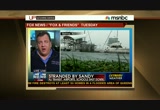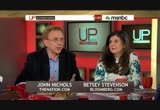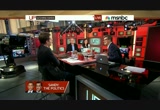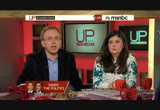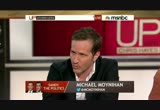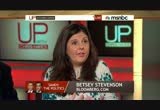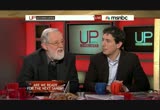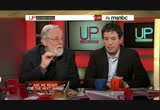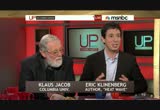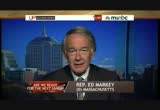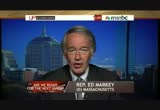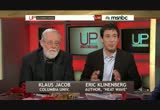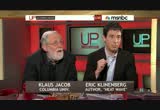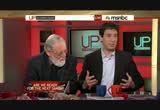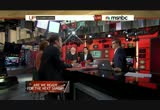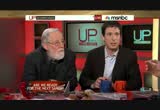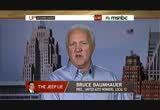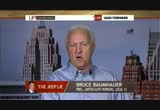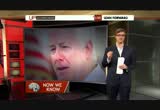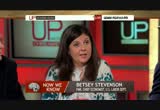tv Up W Chris Hayes MSNBC November 3, 2012 5:00am-7:00am PDT
5:00 am
in this lab demo, bounty basic is stronger than the leading bargain brand. everyday life? bring it with bounty basic. the strong but affordable picker-upper... now costs even less. good morning from new york. i'm chris hayes with only three days left before election day a new nbc news/"wall street journal"/marist poll shows president barack obama leading mitt romney in ohio by six points among likely voters, and it shows president obama with a narrow lead in florida where the race stands at 49% to 47% among likely voters. we'll be talking more about ohio and the republican freak-out over polling analysis later in the program. right now joining me at the table we have michael moynihan cultural editor for "newsweek" and the daily beast ale li beei
5:01 am
stevenson, columnist for "bloomberg view" associate professor at the ford school university of michigan and former chief economist at the obama labor department, and mom to the 3-week-old oliver, congratulations, that's really awesome. all right, it has been five days since sandy came ashore on the east coast as a post-tropical cyclone, the exact location of landfall didn't much matter because it was a 1,000-mile wide storm. at least 109 people are said to have died in the u.s. and another 60 were killed in the caribbean. as of this morning 2.9 million customers remain without power across 15 states and the washington, d.c. the economic losses are nearing $50 billion. flooding of new york subways and commuter train tunnels and loss of business accounts for much of that estimate. with an election just a few days away the political media industrial complex briefly
5:02 am
ground to a halt and then somewhat awkwardly cranked back to life with mitt romney turning a campaign event into a relief rally. president obama heading back out on the trail and pundits growing more and more comfortable speculating consequences of the disaster. local and area officials had to make practical decisions and give emergency briefings and address the anxiety of their constituents. governor chris christie seemed to suggest he wasn't taking the election into consideration. >> is there any possibility that governor romney may go to new jersey to tour some of the damage with you? >> i have no idea. nor am i the least bit concerned or interested. >> right. >> i've got a job to do here in new jersey that's much bigger than presidential politics and i could care less about any of that stuff. the president was great last night. he said he would get it done. at 2:00 a.m. i got a call from fema to answer a couple of final questions and he signed the declaration this morning. i have to give the president
5:03 am
great credit, he's been on the phone with me three times in the last 24 hours and anything that i've asked for he's gotten to me. i thank the president publicly for that. he's done as far as i'm concerned a great job for new jersey. >> new york city mayor michael bloomberg last night canceled tomorrow's new york city marathon after the critics said the resources were needed elsewhere, after i tweeted about it. i can't help but think that pushed him over the edge. he said it should not detract attention from the storm recovery and he made news on thursday when he endorsed barack obama for president saying that sandy brought the stakes of tuesday's election into sharp relief. i thought what happened this week and the interactions between the president and chris christy and michael bloomberg are really interesting. i thought the way we think about politics and disaster was brought into relief. and we're going to talk about the substance. we'll talk about the seawalls and floodwalls and climate change and what we have to do -- how we have to reconceptualize our society and think about disaster in the future but first
5:04 am
i want to talk about the politics of it. because i thought the response to chrissy's actions on the right and generally in the media i thought were fascinating. i -- maybe i'm alone in this. i didn't think he seemed to be doing anything out of the ordinary. it seemed to me like this was more or less politics as usual. that the president when there's a disaster-stricken area the president goes and the governor and they go look at the damage and even from different parties they put them aside for the moment. and people freaked out. and i think the freak-out to me highlighted how much there's been this norm created under republican party of just total implkable opposition at all times so that christie seemed like a betrayal. the other argument is that christie really has been going out of his way to throw mitt romney under the bus. i'm curious what you think about it. >> i'll take a shot. you suggested the political media industrial complex ground to a halt. that's ridiculous. the political media industrial complex was whirling even as the storm was coming in.
5:05 am
i heard everybody in all the campaigns talking about what impact is this going to have and so by the nature of it they were looking for something. and chris christie gave it to them. now, a part of it is that chris christie loves the camera, right? he is the giuliani of this moment. he's doing press conferences. he's physically out there not sleeping, very present. but the key on that one is this is the keynote speaker of the republican national convention. it's not just any governor. he's one of the most known republicans in the country. he's the guy that was supposed to make the case for romney and forgot to mention him. and when he took that question, he could easily have said, look, you know, i think governor romney's got other things to do. i'm pleased -- instead, you listen to that clip. it went on and on and on and it built toward a crescendo i think the president is doing a great job for new jersey. >> and chris christie also i would say not only the commencement speaker but the great hope of republicans, ann coulter wanted him and rupert
5:06 am
murdoch wanted him back in the race and he tweeted christie has to come out hard for obama -- >> for romney. >> i'm sorry, for romney in the next few days or he's a disaster in the next four years. >> i think the thing about chris christie on the "fox and friends" things, that he's disingenuous, that it's stagey, he shouts down reporters in press conferences, i think what we see here, this is actually chris christie, this is the way that he is. when he believes the president is being attentive and doing a good job for the people of new jersey, he doesn't care and he's not going to mow-mow to people on fox or anyone. i was rather impressed. at the end of all this he did get a mention from bruce springsteen who he's a big fan of and he's actually said in a concert, this is true, and said the governor has -- >> someone said, some conservative on twitter said that's what this is all about!
5:07 am
he said it wasn't about -- it's not about mitt romney or anything to get to obama. >> this is interesting thinking about why is it that the public doesn't -- the public would not tolerate a republican governor saying i am not going to accept money from the federal government to help get the lights back on. we will suffer through this as a state. >> right. >> and eschew any help, people wouldn't stand for it. but they will stand for it when the help is about something a little less immediate. if a republican governor said we're turning down this money to fix our schools or unemployment. >> or to build high speed rail. >> or high speed rail. >> internet. >> when the republican governor turns that money down, people don't see the immediate consequences and they don't seem to react. but imagine what they would do if chris christie had stood up and said we're not taking obama's help on this? >> i think it's two things. i think that it's absolutely christie actually being who he is.
5:08 am
i don't think that whole idea that he was being totally phony is fair. but i also think that christie has been the attack dog for president obama specifically and so he's kind of effusive praise seemed really shocking on the one hand but i think truth has been such a casualty when it comes to the way the republicans have run their political campaign and christy being the number one man for romney, you put those two things together and suddenly it feels like he's on this political campaign for president obama with literally days before the campaign. >> right. i think that's partly because we have this kind of which side of you on feeling down the stretch. >> i agree with you, michael, about christie. i never thought he was staged. i thought when he yelled at teachers in town halls, he was being authentically jersey. i didn't think that was stage craft. i thought he was being a jerk. truly a jerk even, you know, even in a totally honest way. >> his compassion and his emotionality and even saying that this is not about politics
5:09 am
right now, of course, it's always going to be about politics but even that point i think came from a very specific genuine place. he's an emotional politician. so, what he articulates comes from that very specific place. >> we live in a time where everybody's a pundit. >> yeah. >> right? the person -- no, they're better than most of us. but the person in the coffee shop, you know, wants to talk about -- especially right before an election. >> totally. >> this is something that happens in america. most americans unlike we of normal characters can shut off politics for a lot of the time. but if you're in the week before an election, everybody's going to look at it. >> that's right. and the fascinating thing is we think we need to explain chris christie. we look to him and know he's a big republican and all the dynamics and i think they saw him standing there saying what they wanted him to say. especially at a point where polling shows, like, 80% of americans really would like to have a little bit of rapprochement and then to have
5:10 am
michael boom blerg loomber berb next day and say this thing tipped me. i'm voting for obama, this is a dynamic significant in our politics. >> what i think is fascinating, of course, one of the key arguments for barack obama in 2008, right, he was going to be the person that brought together red and blue and republicans have i think very wisely chosen a strategy of sort of constant implacable opposition, that has made it impossible for him to fulfill that promise. and the irnlny now is that mitt romney who spent most of the campaign and during the primary telling jokes about what a terrible place massachusetts was, bragging about all the vitos, saying this place is a s sodomite hell that i come from and the democratic majority that he had to deal with as evidence that he's the person that can work across the aisle there's this fascinating campaign down the stretch about who could work best across the al. betsy, you made an important role of government in these
5:11 am
moments and that's the other subtext here and i want to talk about that and the ideological subtext. ♪ i'd like to thank eating right, whole grain, multigrain cheerios! mom, are those my jeans? [ female announcer ] people who choose more whole grain tend to weigh less than those who don't. multigrain cheerios tend to weigh less than those who don't. online outfit piccolo headphones buy now broadway show megapixels place to sleep little roadster war and peace deep sea diving ninja app hipster glasses 5% cash back sign up to get 5% everywhere online through december. only from discover.
5:12 am
5:14 am
you made a good point before going to break about what this highlights about the role of government and i think we tend to have certain scripts in the wake of disaster. first of all, i think there's this back-and-forth about not politicizing it, and i understand a certain impulse, right, which is that you want to not destroy feelings of social solidarity by basically turning people against each other over partisan lines. at the same time, disasters are inherently fundamentally political because they reveal the power relations of a society and the power relations of a society are what constitutes politics in that society. and you talked about the role of government. obviously the role of government has been this kind of light motif throughout the campaign. "the new york times" wrote an
5:15 am
editorial in the wake of a storm saying a big storm needs big government. i think there's a general feelings that these are the times we want the state to come in and do things and people have been pointing out this response mitt romney gave talking about fema, the federal emergency management agency, back in june during a republican debate. take a look. >> fema's about to run out of money and there are some people that say do it's a case-by-case basis and some people are saying maybe we are learning a lesson that maybe the states should take on more of a role. what do you say to that? >> absolutely. anytime you have a chance to take something from the federal government and send it back to the states, that's the right direction. and if you can go even further and send it back to the private sector, that's even better. we should take all of what we're doing on the federal level and saying what are the things we are doing we don't have to do and those things we have to stop doing. we're borrowing $1.6 trillion more than we're taking in. >> the romney campaign in customary fashion walked it backwards and said we're not
5:16 am
sending fema to the states. michael, as the libertarian at the table, should he have come back and doubled down on this and said, yeah, fema, should be in the private sector of the states? >> obviously back on his heels on this and it's not necessarily kind of a libertarian issue in a sense, after there was a lot of anger about the quote circulating and the piece in the "atlantic" said, look, he's not trying to defund fema, you know, this idea of bringing it to the states and everything. should he have doubled down? no. this is purely political calculation, i'm not saying -- >> i'm asking from a ideological perspective. >> i agree. politically it was suicidal. >> in fact, what is fema, i don't know what that means. i'm actually a deeper ideological question which is my knee jerk liberal response to this which confirms my priors, right, which is we need the state to do this kind of thing, is that wrong? i genuinely want to know. >> no. look, i think that there are an
5:17 am
enormous number of problems with fema, one does not have to look very far online to look for people who would know this stuff very well and say this is a hugely dysfunctional organization for a number of reasons. is the solution to that to bring it to the states? look, i think that there's a very, very compelling case to be made for that. i don't think the argument, well, this is a guy that will take all this money and throw it out the window and, you know, good luck getting sort of charity and private companies to do it. i think it's a disingenuous argument. i think there is a smart, sensible argument to be made that on a local level people can pivot and respond to the crises in a better fashion. >> one thing about disasters you do want to start with the local level up and start with the front line people from the town sheriff and work your way up the federal government. >> that's how it happens anyway. >> that's how it happens anyway and it's the way it's structured. having fema is all about risk pooling, right? the point is that certain areas will get hit by natural
5:18 am
disasters more than others and pool it out across the united states. >> some of those areas are poor. they don't have the resources. and so in a great big country where there are some very wealthy people who can pay some taxes, it's kind of a good idea to collect up that money in case where some place people don't have the resources. you know, this is a logic of government. but i will say that if we back up a little bit on this, disasters, like wars, like presidencies, like receptions, are big enough that we can all paint on them, right? >> right. >> we can all put our picture on them. i looked at this thing, i'm a very pro-labor thing, my response is i'm watching union firefighters and union cops and union road crews up through the night, you know, sweating, bleeding, putting out fires, wading through water, union nurses carrying kids to safety, and i'm saying, you know, why does mitt romney bash these people. in fairness, that's not best how i look at it.
5:19 am
it's you're going to look at it differently. and, you know, in a weird defense of mitt romney, in a weird defense of mitt romney, he was answering a deficit question there. he wasn't thinking about fema at all. >> right. in fact, he tried to dodge it a little bit. >> i think that's a really crucial because to me when i think about fema and disasters i'm absolutely confronted by these two americas, the katrina/fema reaction and the sandy/fema reaction and the reality is to argue there hasn't been a significant political response to the significance of fema by different governments and it's not split down party lines. it's simply not true. there was a really great article in "mother jones" that took you through -- >> the development of fema competence. >> right. and who had headed fema and the way that presidents had appointed those fema heads were directly related to how they perceived their significance. so, for example, george bush actually allocated michael brown who was the former -- i just had to read this out, because i was just blown away. michael brown who was the former
5:20 am
commissioner of judges and stewards for the international arabian horse association, that's who headed fema. clinton was the first -- was the first president to allocate the fema head who actually had experience -- >> disaster. >> -- disaster management. it's not political. it's about poverty. it's about race. and when we think about disaster preparedness as well as recovery, the ways in which these two americas break down, you see that again and again and again. >> it's also i think the other point here is that it's something that will happen i think often is people on the left we get into this defensive crouch around the role of government and so we defend the states' actions in the abstract, but if you talk to lefty activist who are part of common ground and katrina it was government bureaucracy who was their enemy. and folks on staten island are frustrated and angry and feeling they're not getting enough attention, the target of that anger is the government
5:21 am
bureaucracy and you can't fall into the trap i think as a liberal saying, oh, the state in the abstract government has a role to play and not also be very clear-eyed about the failures of specific bureaucratic performance, right? >> i was going to come back to this idea you said risk pooling. >> right. >> i think that that's a really important question because we have to ask ourselves does a storm like katrina or sandy, does it hit the united states -- >> right. >> -- or does it hit new orleans or does it hit new york, does it hit a state or does it hit the united states? i think it hits the united states and that's why as a country we actually do need to chip in and send the resources to help clean up. and that's why i find the we can't afford to do this, we have one -- or borrowing $1.6 trillion to be indefensive because, of course, we got hit by a storm as a country, we have an obligation. but there's a second issue for the federal government which is can they play a better role coordinating relief across the country. getting national guard members to where they need to be, getting water where it needs to be, you know, the states certainly are the ones who
5:22 am
should say what they need. >> right. >> but are they in a position to actually coordinate where it should come from and how it should get there and i just don't think they are. >> i think we've been shown an example even with governor christie talking about the speed at which president obama reacted, because, of course, you think about katrina, you think about the slowness with which president bush reacted and speaking to that point, romney doesn't think there's a united states. he thinks of 47% are the folks in new orleans who don't deserve -- >> i don't know if that's a fair characterization. >> all right, but let me make my point, i think you say that but i think if you're living in the spaces, you're living with the legacy of katrina or in the ninth ward, you would absolutely not say that's an unfair argument because you're still living with the legacy with the kind of unfairness that made you a refugee in your own country. >> do you know why you need federal government, you need a federal government because in some states there are governors that will not respond to some parts of their state and you need somebody from the outside that will -- >> or they might politicize or they don't get the help they
5:23 am
need. >> to sort of agree you and against my own point in a way of sort of localizing these things is that, you know, george bush's disastrous performance in katrina is nobody denies, even republicans, but the local level performed disastrously, too, ray nagin, et cetera. >> that's an example. i think that's the point is that the united states, how do you coordinate a reaction. it started with the example of the biggest, you know, the president is the head of the biggest institution in the country. so, who you want institutionally rather than having individual americans respond are two different realities. it's two different americas. >> i want to turn our attention to climate change because i think that was a story that foisted itself on the political discussion this week i think for good actually in a way. climate change and the politics of disaster, my story of the week is next. if you are one of the millions of men
5:24 am
who have used androgel 1%, there's big news. presenting androgel 1.62%. both are used to treat men with low testosterone. androgel 1.62% is from the makers of the number one prescribed testosterone replacement therapy. it raises your testosterone levels, and... is concentrated, so you could use less gel. and with androgel 1.62%, you can save on your monthly prescription. [ male announcer ] dosing and application sites between these products differ. women and children should avoid contact with application sites. discontinue androgel and call your doctor if you see unexpected signs of early puberty in a child, or, signs in a woman which may include changes in body hair or a large increase in acne, possibly due to accidental exposure.
5:25 am
men with breast cancer or who have or might have prostate cancer, and women who are, or may become pregnant or are breast feeding should not use androgel. serious side effects include worsening of an enlarged prostate, possible increased risk of prostate cancer, lower sperm count, swelling of ankles, feet, or body, enlarged or painful breasts, problems breathing during sleep, and blood clots in the legs. tell your doctor about your medical conditions and medications, especially insulin, corticosteroids, or medicines to decrease blood clotting. talk to your doctor today about androgel 1.62% so you can use less gel. log on now to androgeloffer.com and you could pay as little as ten dollars a month for androgel 1.62%. what are you waiting for? this is big news. what are you waiting for? try running four.ning a restaurant is hard, fortunately we've got ink. it gives us 5x the rewards on our internet, phone charges and cable,
5:26 am
5:27 am
what's at stake? at about 8:00 p.m. on monday night the east-facing windows in my brooklyn apartment started to bubble and buckle inward in a deeply unsettling way. the wind howled and we thought it prudent to move ourselves away from the wall exposed to the elements. that one moment of sharp anxiety was as bad as things got. we were lucky. our power never went out and my neighborhood is on high enough ground it wasn't flooded by the storm surge. there are a few downed trees that took out parked cars but that was about it. a few neighborhoods over a young couple were out walking their dog at some point that evening and they were struck by a falling tree and killed. they are two of the estimated 109 people who died due to the storm here in the u.s. a death toll that is mercifully lower than one might anticipate given the scale of the damage. destruction is most evident here in new york city in staten island, in queens devastated coastal neighborhoods and in the powerless precincts of lower
5:28 am
manhattan where cars roll through intersections without streetlights and commuters trundle over the bridging walking over an east river whose waters overflowed its banks filling the subway tunnels that connect the boroughs and rendering much of the system unusable. the mta chairman said new york subways have, quote, never faced a disaster as devastating. it's very rare when the subways in this city don't run. but there are some things simultaneously awful and exhilarating about those moments when normalcy is suspended. new yorkers will still tell you about the solidarity and fellowship they share with their neighbors on their stoops on the lightless nights of the 2003 blackout. or the comfort and aid they found in each other as they fled through the streets on foot covered in dust away from the falling towers. obviously the loss of life and intensity of trauma caused by sandy is nowhere near the scale of 9/11. but it's fair to say the city hasn't been this devastated since that september day. and as many unsung civil
5:29 am
servants and first responders and utility workers labor tirelessly to get the city running again, i'm reminded that one of the raw truths of 9/11 is that the first thing a competent government must do is protect its citizens. it can't protect them from everything nor should it try but i think we all recognize amidst the horror of 9/11 we want our government first and foremost to keep us safe. the state cannot eliminate senseless death, but its duty is to reduce its likelihood. it's a conservative insight really the idea that government's job before all else is to keep its citizens secure, to protect them, that everything else comes after. and lefty that i am, i'm reminded in this moment that it contains an undeniable core truth -- and, yet, here we sit with a political system that could barely bring itself to acknowledge or discuss the tangible danger climate change poses to us, never mind undertake the massive sustained effort necessary to combat and adapt to it. andrew cuomo as careful a
5:30 am
politician as you'll see tried to note the elephant in the room without ever naming it. >> there has been a series of extreme weather incidents. anyone that's -- that's not a political statement. that's a factual statement. anyone who says there's not a dramatic change in weather patterns i think is denying reality. >> and his endorsement of president obama this week new york mayor michael bloomberg rote in 14 months two hurricanes have forced us to evacuate neighborhoods something our city government had never done before. if this is a trend, it is simply not sustainable. no, it's not sustainable. things that can't go on don't. it's true, sandy was a freak storm, a bad confluence of a number of low probability events that could conceivably happened in some alternate climate that wasn't warming. but this climate, our climate, is warming, and as it does, low probability events like this will become more probable and
5:31 am
more intense. carbon emissions are trapping extra energy in our atmosphere and with extra energy come more extremes, higher sea levels, drier droughts, hotter heat waves and heavier, wetter storms. we need a crash program in this country right now to re-engineer the nation's infrastructure to cope with and prepare for the climate disruptions that we have already ensured with the carbon we've already put into the atmosphere. as well as an immediate, aggressive transformation of our energy production, economy, and society to reduce the amount of carbon we will put into the atmosphere in the future. this is as fundamental, as elemental as human endeavors get. the story of civilization is the long tale of crusaders for order battling the unceasing reality of chaos. and it is a kind of miracle that we have succeeded as much as we have, that airplanes fly through the air and roads plunge beneath the water and the entire teeming lattice work of human life exist
5:32 am
in the manifold improbable places it does. but it's the grand irony that imposing this order on the world we've released millions of years of stored up carbon into the atmosphere which is now altering the climate and threatening the very monuments of civilization we so cherish. we absolutely have it within us collectively to beat back the forces of chaos once again, but we must choose to do so. and the time for choosing is now. you are either on the side of your fellow citizens and residents of this planet or you are on the side of the storm as yet unnamed. you cannot be neutral. so, which side are you on? [ male announcer ] when was the last time something made your jaw drop? campbell's has 24 new soups that will make it drop over, and over again. ♪ from jammin' jerk chicken, to creamy gouda bisque. see what's new from campbell's. it's amazing what soup can do.
5:33 am
[ birds chirping ] are you sure you can fit in there? [ chuckles ] ♪ ♪ [ male announcer ] around view monitor with bird's-eye view. nice work. [ male announcer ] introducing the all-new nissan pathfinder. it's our most innovative pathfinder ever. nissan. innovation that excites. ♪ nissan. innovation that excites. this is hayden. he's five years that's elizabeth. and that's skyler... and his mom, nancy. they're just a few of the californians who took it on themselves to send you a message about what they need to restore years of cuts to their schools. prop thirty-eight. thirty-eight raises billions in new revenue - bypasses sacramento
5:34 am
5:35 am
5:36 am
claus, i wanted to have you here, because "new york times" ran a piece recently, and this is a headline, it says, climate change -- new york is lagging as seas and risks rise critics warn, it was about the fact that the city was exposed to increased risks as climate change brought sea level up. and it quotes you, a report that you did, in 2009. and this is your prediction about what would happen if there was a storm with a sufficiently high storm surge just a foot higher, i believe, than irene, just about. and you said, if the surge had been just that much higher, subway tunnels would have flooded, segments of the fdr and roads along the hudson river would have turned into rivers and sections of the commuter rail system would have been impassable or bereft of power, the most vulnerable systems like the subway tunnels under the east rivers would have been unusable for nearly a month or longer at an economic loss of nearly $55 billion. this is i think eerily
5:37 am
preshient. what are the circumstances under which you undertook this report talking about what the vuln vulnerabilities of new york city were? >> well, in 2009 first mayor bloomberg and later the state through its agency charged a group of scientists to look at the consequences of climate change and how new york city on the one hand and new york state on the other hand should adapt to it. as part of that study, we in the certa study, we were making a case study in which we had 100-year flood or storm surge hitting new york city. and with a lot of help of the engineering department students at columbia university, we came up with a very detailed analy s analysis.
5:38 am
and it showed that the subway tunnels would flood within 40 minutes and so on. it was eerily, incredibly true what happened four days ago. right down to the detail that the brooklyn battery tunnel would be entirely flooded, the queens midtown town only partly flooded. i mean, it's terrible to be right. the point is here that this is information that was available one to two years ago now. and it shows that just reducing scientific, technical result is not enough. >> right. >> the political process has not taken notice of the information that we were charged to produce for them. >> and this is the fundamental
5:39 am
issue that we have up and down this -- this issue specifically on climate but also disaster, right, eric? you can go back and you can read reports, and i did, reports about what would happen if a storm hit new orleans and a storm surge pushed over the levees and the problems that would happen in the ninth ward and the evacuation problems and everything down, down, down, down the line written two to three years before katrina actually happened and the political infrastructure did not make the governing choices that would have prevented it. >> we act as if we have a will not to know about these dangers, and when we're warned of them, we freak out. we don't know what to do. we get overwhelmed and scared. we've just gone through three presidential debates in which the concept of climate change never came up once. this was mother nature speaking back and saying, i will be heard. you have something to reckon with. unfortunately we now live in a moment where this debate will become inescapable. and the silver lining that could
5:40 am
come out of this is that this could be the kind of event or historic experience that becomes a turning point, that makes a conversation about climate change a fundamental part about -- of conversations about security and governance. >> one of other things we talk about with climate and climate mittation and carbon tax and one of the things that's highlighted in parallel to that we also have to take a hard look at how we are engineering our cities and creating a kind of resiliency in the massive population centers. i want to talk about how we need to be thinking about that right after we take this quick break. . morning starts in high spirits, but there's a growing pain in his lower back. as lines grow longer, his pain continues to linger. but after a long day of helping others, he gets some helpful advice. just two aleve have the strength to keep back pain away all day. today, jason chose aleve. just two pills for all day pain relief.
5:41 am
try aleve d for strong, all day long sinus and headache relief. try aleve d for strong, all day long a wiit takes some doing.n't just happen. some coordinating. and a trip to the one place with the new ideas that help us pull it all together. from the things that hang and shine... ...to the things that sparkle and jingle. all while saving the things that go in our wallet. more saving. more doing. that's the power of the home depot. trade in any light string and get up to five bucks off the latest holiday leds. can you help me with something? nope! good talk. [ male announcer ] or free windows 8 training when you buy a computer at staples. another way staples makes it easier to upgrade.
5:43 am
♪ [ male announcer ] some day, your life will flash before your eyes. ♪ make it worth watching. ♪ the new 2013 lexus ls. an entirely new pursuit. without freshly-made pasta. you could also cut corners by making it without 100% real cheddar cheese. but then...it wouldn't be stouffer's mac & cheese. just one of over 70 satisfying recipes for one from stouffer's.
5:44 am
on top of that we will have storms. what does this mean? it means that coastal areas, everything that is luckily five feet plus whatever tides you have higher, needs to be looked at it from a land use or urban planning use. so, either we protect entire cities like new orleans, right, and then having to say later on
5:45 am
something about that because i think if you build barriers for new york city, you have to have an exit strategy because those barriers will not last forever with rising sea level. >> grim. >> which means we have to do something behind the barriers anyhow to protect us just like new orleans was unprepared when the barriers failed. so, we have to prepare for what we do when the barriers fail. >> preparing for failure is a huge part of disaster preparation. it's one of the things that's amazing in your book about the heat wave is that you begin to see systems fail. the cell phone network gets overused and water doesn't work in high-rises. how do you prepare for failure? >> well, you have to prepare for systems to be resilient which means you need to invest in infrastructure, you need to update the grid, for instance. every time there's a heat wave in this country every summer the power goes out and in some cases for days. one barometer to the extent to which climate change is
5:46 am
increasing the extreme events, i find myself getting called more and more every year because thee events are regular. you also need to build up structures to provide support and care. too often our conversations about these issues are exclusively engineering and physical science kinds of questions. those matter, no doubt. they're fundamental, but there's a social dimension to this as well, which neighborhoods are affected, which individual people are affected, and it's predictable. >> fascinating, zone "a" ev evacua evacuated, low-lying residents there were twice as likely to be residents of. i want to bring in ed markey, co-sponsor of the only climate bill to ever pass the chamber of congress. congressman, what is your reaction to the stunning absence of this issue that you worked so hard on and labored over and ground out a large bill with tons of technical details to
5:47 am
carve votes on and it's now disappeared from the political conversation? >> well, i think that -- i think that mother nature decided that she was going to inject it into this election. if it wasn't going to be raised in any of the debates, then she was going to find a way of having this be discussed. and so this election for next tuesday is now framed. it's mother nature versus the unrestrained use of oil and coal and other polluting sources. i think the public now sees what the consequences are of having this issue just be ignored. it's no longer just some abstract issue that might be affecting the arctic. what's happening in the arctic is now affecting the weather here on the east coast and all across the united states. and so it's now an issue. and i think that it's really got mitt romney on the defensive, as he should be, because the mitt
5:48 am
romney who was the governor of mch massachusetts, my home state, he believed in climate science, but the mitt romney that runs for the republican nomination for president in 2012, he can't believe in climate science, he has to make jokes about it in order to get the nomination of one of the most historical parties of our country's history and that's a sad state of scientific affairs. >> mayor bloomberg the key to the endorsement was the position on climate change and he talked about the choices being one candidate that sees climate change as an urgent problem that threatens our problem, one does not. i want our president to place risk management above politics, president clinton and president reagan found success while their parties parties, and he can too. president obama has not done a lot to talk about climate on the campaign trail. it's probably going to be a republican house. i believe the stakes in this
5:49 am
election are between one candidate who accepts of the science of global warming and one who edges on it. but what is the real difference between the policy that we can see, convince me that if i'm a climate voter that my vote is going to matter on tuesday. >> oh, my goodness. mitt romney says that he's going to roll back the requirement that the fuel economy standards of the vehicles which we drive go to 54.5 miles per gallon by the year 2026. if he rolls that back, that's equal to 6 billion metric tons of co 2 going up into the atmosphere, that's one whole year of total co 2 to the united states. p.m. obama is committed to going forward with it, that's all of the oil we import from the persian gulf on a daily basis. on december 31st of this year romney said he'll allow all the wind tax breaks to expire so the wind industry is going to collapse in our country even though 12,000 new megawatts of
5:50 am
wind have been installed in the united states this year alone. and barack obama says he's going to extend them and give the same kind of breaks to solar going out into the future. the president's epa is looking at the regulation of green house gases and mitt romney is saying, absolutely not. so, issue after issue, one after another, there is a big dividing line between these two people, and for anyone who thinks that there will be no difference if they elect one or the other on this issue, they could not be more wrong. okay? this is a stark difference and it's going to actually impact how many people in the future die, how many people in the future have their lives changed unalterably by climate change here in the united states, not around the world, here in our country. >> congressman there's a bunch of questions for you here at the table. i want to take a quick break and bring you into the discussion right after this. follow the wings.
5:52 am
5:54 am
president obama promised to begin to slow the rise of the oceans -- and to heal the planet. my promise is to help you and your family. >> that was mitt romney pausing for laughter in talking about the sea level rise at the rnc which is a really shocking moment to me. esther, you had a question you wanted to ask congressman markey. >> i did. listening to this i think one of the big challenges is the degree to which the science has become so politicized, that evident matters less than which party politician is articulating what may happen with climate change. but when i hear you talk about on a sunny day in 2100 we'll see the seas and the storm rise, i literally hear a hollywood movie featuring will smith and tom
5:55 am
cruise. do you know what i mean, there's an element on the ground it's become so politicized, how does that move. events matter because they create connection and it humanizes something that has felt abstract and it felt like little due respect to you that it doesn't affect the majority of people, so there isn't the connection. what sandy does is make it immediate, specific, direct and targeted. so, i want to ask the congressman and you about the evidence shows you knew this was going to happen and so, therefore, what happens in 2100 is specific as well, but how do you move beyond the politics so that people pressure makes it more potential legislation? >> congressman, yeah, is there any hope of forward movement in, say, a house dominated by the republican party for political movement on this? >> look it, congress is a stimulus response institution. there's nothing more stimulating than watching night after night, day after day, millions of people paralyzed along the east
5:56 am
coast. this is going to have the same impact that 9/11 had on how we protect ourselves here domestically. it will have the same impact that the bp oil spill had in ensuring that we don't ever again have the same lax safety standards and oil drilling off our coastline. this is a game changer. and i agree with what the gentleman said, because this is no longer just a hollywood blockbuster the day after tomorrow. this is now a blockbuster storm which actually hit. so, the day after tomorrow is now today. it's in new york. it's in new jersey. it's in connecticut, and weem are watching this each day. and there won't be any jokes about climate change again. there won't be any dismissal of this again. it won't stop the oil industry, it won't stop the coal industry from trying to block legislation. but i think moderate republicans in the congress above the mason-dixon line are never again going to be allowed to just laugh along with these jokesters from coal country and pretending
5:57 am
that climate change is not real. >> democratic congressman ed markey, thanks for joining us this morning. more on this when we come back. . this is the age of knowing what you're made of. so, why let erectile dysfunction get in your way? talk to your doctor about viagra. 20 million men already have. ask if your heart is healthy enough for sex. do not take viagra if you take nitrates for chest pain; it may cause an unsafe drop in blood pressure. side effects include headache, flushing, upset stomach, and abnormal vision. to avoid long-term injury, seek immediate medical help for an erection lasting more than four hours. stop taking viagra and call your doctor right away if you experience a sudden decrease or loss in vision or hearing. this is the age of taking action. viagra. talk to your doctor. see if america's most prescribed ed treatment is right for you.
5:59 am
6:00 am
that moment you enjoy it at home. stouffer's. let's fix dinner. good morning from new york, i'm chris hayes here with michael moynihan from the daily beast, klaus jacob from columbia university, eric klinenberg from nyu and esther armah. we're talking about the ways in which the sandy disaster has inserted climate into a political debate that had failed to mention it and also the broader question about how we create politics of accountability and governance mechanisms that prepare us for the resiliency we'll need in the coming era. >> we need to retrofit our cities, let's face it. we see disaster after disaster, year after year, cities that your unable to withstand the pressures of this new planet we
6:01 am
live on, the ecosystem is different, the environment is different, and we will fundamentally need to rebuild at some level. now, we are already investing tens of billions of dollars in the project of homeland security. we have tried to protect ourselves from terrorism. we have not done a very good job protecting ourselves from these completely predictable routine events. and i think at a minimum we need to have a conversation about how to redistrict homeland security so that this becomes an agency that actually safeguards us. >> well, this brings up a good point. "a," this point that i'm obsessed with and i ride the hobbyhorse on the show all the time and we have the argument, government good or bad, bureaucracy, good or bad, and bureaucratic performance exists on the massive spectrum. some really, really work and some are dysfunctional disasters, right? and the question is how do we move them and get good governance at our institutions. ed markey said this will be for climate for what 9/11 changed
6:02 am
our terrorism policy, and i'm not sure that what the -- what we built -- my inner libertarian is saying uh-oh, and i suspect you feel the same way. >> we were talking about this at the break. there is a libertarian argument or a smaller government argument to be made that we should prepare ourselves better for this, because, you know, people can look up robert hicks to look at what happened during wartimes and disasters, if you do fear the size and scope of government growing and just the lig lumbering agencies that don't perform particularly well, they tend to come into existence after major catastrophic events, and this happened after 9/11 and you won't find a libertarian to be a full-throated defender of the department of homeland security frir security, for instance. and that's one of the worries and one of the ways that infrastructure to prevent this type of disaster is important. >> is there anyone that believes that the private sector at this moment is capable of doing the long-term planning and strategizing that it will take to deal with the threat of
6:03 am
climate change and retrofitting cities? i think one of the issues here is that government is the only kind of institution we have that can think about these things over the long term. we have the private sector acting in exceedingly short term manners. >> you disagree? >> look, scientists and even engineers thinking about that all the time, and make statements often they come out as a very inconvenient truth. and the question is, how does the public respond to that inconvenient truth. the real major point here is, for instance, look at fema again, there are two tasks to fema. one is to respond after disasters. but the other they have neglected since clinton is to mitigate, to reduce the risk in the first place.
6:04 am
and fema has been gutted from that task. and now we see the effects. >> this is stats that come from a political science journal article, disaster spending since 1988, the amount of money that the u.s. spent on disaster relief has increased 13 times while the amount of spending on disaster preparedness has been flat. >> or reduced. >> or reduced. what we have is the perverse political incentive, what happens politically if there's a politician and there's a disaster, you're on the news every day doing disaster relief and that's when all the incentives to turn on the spigots and make the money flow, i'm not saying that's a bad thing. we don't have the same incentives to prevent the disaster from happening in the first place because what's the political gain from that? >> you are more cynical than i am. >> we need to place it in context as well, let's remember over the last several years of fiscal austerity, we've been cutting back programs at the local and state levels some
6:05 am
fundamental programs that are for the protection of most vulnerable people, services for home care, for health care, for transportation, the kinds of things that we don't perceive on an ordinary level, that we don't discuss very much in the media but that actually produce resilience in communities, so when you see the numbers from fema in some ways they speak for the politics of austerity and i can tell you spending a lot of time with the obama disaster team they are actually working on politics of resilience which is impressive and imaginative. >> and the paradigm that disasters pamplify existing stresses in society. so, what they bring out is all our fallacies, okay? >> go ahead, please. >> i was going to say the trouble with that whole issue about the most vulnerable in society who are impacted is that that has helped fuel the political partisan nature of how we think about preparedness and who is going to be prepared. i think what sandy succeeds in doing because it impacted the
6:06 am
financial district -- >> equal opportunity disaster. >> it literally is and you need in terms of the politics how we deal with this issue, you needed an equal opportunity disaster in order to bring a much broader section of the pop pulous to brg behind the science. we were talking at the break that with katrina there was an injection of action but there was a real element of shame and that shame silenced some of the action. the thing about sandy is it impacts republican land, it impacts wall street specifically, my radio station is right on wall street and we ended up under ten feet of water and that conversation helped change the politics as well as the broader people that were impacted by sandy. >> i think it's geographic more than anything else. the fact that it hit new york and all of us, you know, live in new york and we also -- >> the media center of the country. >> if you notice one -- >> the financial center. >> if you notice one small thing is that staten island has been
6:07 am
struggling, you know, unbelievably in the past -- >> half the casualties. >> half the casualties on staten island, no power, no water. people might have seen this video but a woman pleading with chuck schumer saying we need relief here. and the interesting thing about this is in the kind of media narrative we've heard about staten island and we've heard about even -- people said to me, you know, you and i both live in brooklyn. brooklyn's fine. coney island is not fine. i think that this an interesting thing, the geographic thing, i have power and staten island has not been part -- really part of the conversation and i hate to say this but until it's really been politicized, but there's been some failures happening and this is becoming a much more political issue and that's when staten island comes up. >> staten island, i want to talk about it for a second, one of my dearest friends is from staten island, we were e-mailing back and forth, i love you, megan, and she was just saying staten island has a strained relationship with the boroughs, it voted to secede in 1997.
6:08 am
there are people there who are really suffering right now and going through a lot and one of the things she pointed out there's two hospitals on staten island for half a million people. when the storm hit all the bridges shut down and one of the hospitals, staten island university hospital on the water basically was shut down immediately, so during the storm there's one hospital for 500,000 people on an island and that gets to your point about the broader foundation of resiliency is fundamentally the kind of public services and infrastructure and basic level of social resiliency we have before the disaster even hits, klaus? >> well, the private sector cannot do the planning. they plan for themselves. not for the public for the infrastructure. and that's what we really have to understand. we need good, informed government that can have the resources which means as taxpayers we have to pitch in. >> i'm glad to hear you say that because i thought we were disagreeing about that. but, look, the great symbol of this for those of us who are in
6:09 am
lower manhattan who had no power for days, the power came on at 4:30 this morning was to see the glistening tower of goldman sachs downtown where the power was there. they had planned for the company, that's what private sector organizations tend to do. who is going to plan for the collective? not just new york city but the collective in this country. >> i want to push back slightly on this. >> please. >> yeah, here's the thing i think we set up the false binary when we're talking about sort of free market stuff or limited government people. you know, there is a tendency to conflate libertarian ideas or maybe even conservative ideas which i don't speak for but with an ar anarchy. the mitt romney quote that we should put it back to the states. there are people, but i don't think there's a big movement of people that wants to get the government entirely out of the business of preparing for disaster. there's a lot of people that made the argument in katrina that walmart, there's a number of people wrote about this, a few studies about this, that pivoted really fast and provided
6:10 am
6:11 am
6:13 am
all right. we're talking about climate change and disaster and the politics thereof and, klaus, you had something you wanted to say to michael. >> well, michael, i heard probably the word libertarian 20 or 30 times. >> yes. >> honestly, i'm sick and tired of it. >> me saying it or chris saying it? >> in general. >> in general, okay. >> the reason is this is a disaster and we shouldn't introduce ideologies into this. we have to think about what's
6:14 am
the reality out in the street and those who are really affected by it right now, they couldn't care less about those words. and what is needed is right now response of the first responders, response by the public, yes, by government, and ultimately by the society at large. >> let me really defend michael for a second. let me jump in on your side -- >> can i jump in response now? >> yeah. >> it is a political issue. it is a politicized issue and we're talking, you know, in the context of what the right solutions are, and i just want to say and be very, very sort of strident about this is that nobody has a monopoly on injecting politics into an issue that should be politicized like benghazi, it's a political issue. we have the bloomberg "business week" cover, i have the thing on huffington post sandy has, in fact, brought together a trifecta of progressive policy
6:15 am
vindication. i have no problem with people saying that. we have to talk about these issues from a political perspective because the solutions in the future are political and our politicians, ed markey, and everybody else have to fix this thing. >> i agree with it completely and i think in terms of the ideological point i tend to be skeptical of people wanting to get rid of ideology because i think it infuses everything. the point michael is making which i think is a good one for liberals to hear is that the caricature version of libertarianism where the government doesn't do anything, i think what you were saying there's a role -- you can call yourself a libertarian and still believe in disaster relief. from the state and that's an important point to hear. the other thing i want to say to you, eric and klaus, and this gets to the idea of the seagate, people say one way to protect -- one way we can protect new york is to build some seagates, they do it in -- >> seawalls. >> they do it in amsterdam. it would be -- i think we have an animation of a dutch firm which drew up an animation of what this would look like. basically you have ships coming through and then, you know, they
6:16 am
can pass and we can have ship traffic in the verrazano-narrows when the time comes and there's a huge storm surge, you see the walls sort of come together there and they go up in this sort of sci-fi-esque kind of fashion. and one of the things i want to say here is, you know, when we think about the army corps of engineers, right, that's the state, that's the government. and they have this public role. and they have been disastrously dysfunctional in all kinds of ways, right? there are the levees that they built and tested in new orleans didn't work when they should of. there are all sort of reasons that the shipping channel called mr. go in new orleans was creating a massive point of storm surge at the heart of new orleans and they ignored the warnings and their own reports about dredging. my question to you if we do put money up there and commit resources to it and we have a dhs-type thing what assures me that we'll have abetter results than we have from, say, the army corps of engineers? >> i think here the key point is
6:17 am
to return to what you said before the kind of people we use to lead the agencies. i think there's a stark choice for americans to make in the elections this tuesday, you know, do you believe that a particular candidate can actually make good decisions about who to lead organizations like this, when clinton was president, he put james lee witt in charge of fema and by all accounts on the left and the right, he did a tremendous job of revitalizing the organization, to make it work, to protect americans. when bush took over as president, he put michael brown in fema and we all know the story, it was ludicrous to see michael brown criticizing president obama today for reacting. i mean, my goodness! >> right. >> so i think that we can't guarantee that any particular agency will work perfectly but we do have to think about which leader is going to put in position people who can act effectively, who will respect the professional workers and government who do such a good job, it was important to hear john nichols talking earlier about the laborers who come out to putting their own lives at risk in situations like this, you know, we need to maintain
6:18 am
support for this. and i want to be clear that over the last 15 years, we have seen republican administrations eviscerate the professional workers in federal agencies, we have seen republican governors eviscerate state agencies, and in my view that's what makes us less resilient and more vulnerable. >> i just want to say because i think the point that you make picks up this idea that you say that nobody really seriously takes their idea of lessening government a serious point. >> i don't mean lessening, i mean privatizing the relief to the disaster victims. >> the way the republicans deal the head of fema and completely ignoring the importance of that role and being willing to institute somebody who has absolutely no experience and cannot do the job signifies how willing a republican government is to completely negate the importance of -- >> that's an ideological point and then there's an actual sort of partisan record point about whether you care enough to think
6:19 am
that these functions are important. >> look, the bush administration's record on this -- >> speaks for itself. >> -- indefensible. but i wanted to ask eric and klaus a question, this sort of conversation about money and about, you know, how much money is being sort of allocated for this stuff that's been cut, we have two studies we talked about, one very interesting thing that klaus wrote in 2009 and you had mentioned a few that had kind of rasputin-like way said this is going to happen in new orleans, too. it doesn't strike me and this is actually a question that this is a lack of money. it wasn't as if these projects had started and they ran out of money or the funding was cut. is it -- am i wrong in thinking that this stuff was never reacted to at all? >> hold that thought i want you to answer after a quick break. ♪
6:23 am
question about resources and preparation, and you had something to say about new orleans and the -- >> well, let's take new orleans. katrina cost roughly $100 billion. the u.s. army corps of engineers spent i think on the order of $15 billion after the storm to fix the problem. it would have taken maybe $8 billion to $10 billion or something like that to fix it before the problem. so, for every $1 that you spend ahead of disaster protecting against disaster has been on average nationwide shown to save you $4 of not-incurred losses. >> right. >> in new orleans it would be a 10-1 benefit cost. >> i should also say there are some people and harry chscherre is one of them and say it's
6:24 am
still not fixed. >> and you have to think about it because we should not fall into the trap what we are in new orleans. so, there's the discussion about barriers. i think all options are right now on the table. what we have to do is spending money so engineers, not levees, but engineers can go through the options and price them out and then see for how long that is good. >> i just want to intervene, again, on the political issue here which is that the republican party has been against science and not just environmental science and climate science but the science of engineering, the science of evolution, i mean, this touches something very deep in our political debate right now, and we are at a moment where we need innovative investments in scientific research. we need to think about how to rebuild cities. we need to invest in smart infrastructure. and this is part of the
6:25 am
political decision that americans have to make on tuesday. >> let me say, though, science is necessary but not sufficient for these decisions. >> absolutely. >> science doesn't tell you what you do. we're still a democratic society. >> we have options. >> options. >> right. >> and the political process has to decide which way to go. >> all right. klaus jacob from columbia university who wrote an incredibly prescient report about what would happen to new york during a storm surge and was unfortunately borne out this week. it was great to have you at the table. thank you. >> thank you for your work and thank you for being here. >> and eric klinenberg from nyu, thank you for joining us. why mitt romney is lying about the auto bailout. your leg. maybe you want to incorporate a business you'd like to start. or protect your family with a will or living trust. legalzoom makes it easy with step-by-step help when completing your personalized document -- or you can even access an attorney to guide you along. with an "a" rating from the better business bureau legalzoom helps you get personalized and affordable legal protection. in most states, a legal plan attorney is available with every personalized document to answer any questions. get started at legalzoom.com today.
6:26 am
and now you're protected. get started at legalzoom.com today. try running four.ning a restaurant is hard, fortunately we've got ink. it gives us 5x the rewards on our internet, phone charges and cable, plus at office supply stores. rewards we put right back into our business. this is the only thing we've ever wanted to do and ink helps us do it. make your mark with ink from chase.
6:28 am
introducing the new droid razr maxx hd by motorola. now more than ever droid does. mitt romney asking voters what do you want, just tell me, i'll tell you. president obama's revile of general motors and chrysler which in all likelihood would have been liquidated had his administration not kept them above water with a
6:29 am
government-led rescue in 2009 is pretty popular in ohio. popularity is an obstacle to mitt romney who opposed a key part of the rescue when initiated by the bush administration and now finds himself with a stubborn polling deficit in a state he more or less has to win to win the presidency. so, the romney campaign has e a escalated their attempts to rewrite the history of the auto rescue and are now simply making things up about the current auto industry that exists today. they claim that president obama sold chrysler to italians who plan to build jeeps in china. >> who will do more for the auto industry? not barack obama, fact checkers confirm his attacks on mitt romney are false. the truth? mitt romney has a plan to help the auto industry. he's supported by lee iacocca and "the detroit news." obama took gm into bankruptcy and sold chrysler to italians who are going to build jeeps in china. mitt romney will fight for every american job. >> i'm mitt romney and i
6:30 am
approved this message. >> the ad is aggressively misleading so much so that it caused panic calls from the ohio workers at chrysler jeep plants who feared their jobs are being outsourced and frommed gm and chrysler to set the record straight. the ceo of chrysler wrote an op-ed saying i feel obliged to restate our position. jeep production will not be moved from the united states to chi that. jeep assembly lines will remain in operation in the united states and will create the backbone of the brand. there was this response later in the day from gm spokesman in "the detroit free press" we've clearly entered some parallel universe during the last few days not of campaign politics at its cynical worst will diminish our jobs of jobs in the u.s. and the obama campaign worked up their own response ad and the president rebutted mitt prromne directly. >> you've got folks who work at
6:31 am
the jeep plant who have been calling their employers worried, asking is this true, are our jobs being shipped to china? and the reason they're making these calls is because governor romney's been running an ad that says so. except it's not true. everybody knows it's not true. the car companies themselves had told governor romney to knock it off. i know, you know, we're close to an election, but this isn't a game. these are people's jobs. these are people's lives. >> back with us at the table now john nichols my colleague at the "nation" magazine and betsey stevenson, great to have you back. i should note one small technicality, right, which is they are -- jeep is going to do -- open a factory to produce jeeps in china for the chinese market. so, the point is that they are not moving jobs. there's not outsourcing, they
6:32 am
are opening a new factory in china to produce jeeps for the chinese market and i should note this, this is something i learned going to china which is a fun and interesting fact, i think, chinese consumers love american cars. >> yep. >> love american cars. american cars have hugely high status in china and so american carmakers are very excited about the chinese market to make that point. john, what role is this alto question playing in the politics out there? you've been reporting in that region of the country for years. >> it's huge. i mean, it's giant, because the american auto industry when it got going, you know, they started in detroit, it's true. but then they kind of moved out in spokes down to toledo, over to lordstown, across the lake to kenosha, down to indiana. the fact of the matter is there are very few ves in america that are so broadly spread through regions. now, the way that most of our media covers it, it's just michigan, right? the fact of the matter is, identify was the editor "the toledo blade" for many years, our line always was when
6:33 am
michigan gets a cold, toledo's got pneumonia. this is in many ways auto is as big or bigger issue in ohio for a whole bunch of reasons. and the fascinating thing about this is, this is an intentional strategy by mitt romney. it is one of the most remarkable things i've ever seen in politics and i've covered a lot of politics. he went to ohio and he said, i read in bloomberg that they're going to shim your jobs -- he said it straight on. and move it all over. and then they immediately called out. and chrysler -- at fiat, chrysler said this would take a circus acrobat to read the article that way. that's when you shut down. no. then they go up with an ad saying it. then they get called out by the head of fiat. and then they get called out by gm. then they go up with a radio ad that is even more aggressive, and then paul ryan goes out on the trail and goes back to
6:34 am
romney and romney's initial arguments about they're shipping stuff over and totally trashing the auto bailout without ever mentioning that paul ryan voted for the auto bailout. it is surreal and i have to tell you "the toledo blade" my old paper, front page stories each day about this isn't true, how are people responding. i think that when the history of this campaign is written, there's going to be a chapter on this and it's going to be mitt romney's -- i mean, it is a high bar, mitt romney's dumbest move. >> betsey, can you adjudicate a little bit this dispute about what happened in auto in terms of mitt romney's contention that he was basically for the policy that ended up happening even though he clearly was intervening in the debate to make sure that policy didn't happen. >> well, i think he wasn't for the bailout. i don't think anyone thinks he was. he's on record saying he wasn't. >> right. >> but to be fair to him, there were a lot of economists who said -- >> yes. >> -- this is private sector
6:35 am
business, if they can't make it, we need to let them go belly up. there were other people who said, look, we're facing the biggest credit crisis this country has faced since the great depression. they can't borrow the money they need, should we let them go bankrupt because they are in this kind of problem when the entire country's financial situation -- financial industry is having this kind of problem. and that's -- i think it was, you know, a legitimate decision to say we're going to lend them that money. not everybody supported it, though, and romney didn't. >> i want to bring in bruce baumauer from the automakers local 12 which represents jeep makers in the plant in toledo, ohio. i want to hear what you're making of all the back-and-forth. >> it's been quite a week for us you can imagine when the initial remark was made that they were transferring all jeep production over to china. i got in the offices the next morning, i had people in there. i had three generations. i had a woman, her father, and her son who all work at the
6:36 am
plant who are in -- she was in tears thinking that there was some truth to that, so it's pretty unsettling for a day or two, but then the ceo came out and squashed that, and we also reminded people that there's nothing new about us building jeeps in china. we built jeeps in china -- actually, i worked for american motors in 1979 when they owned jeep corporation and they negotiated in '79 to deal with beijing, which created a company called beijing jeep, and we opened up that plant in 1984. >> that's amazing that's, of course, george romney's -- that's old mitt romney's father's old company and it was a pioneer in chinese production back in 1979. >> exactly. >> i want to hear more about how this is playing out politically and how you understand the stakes of this on tuesday right after we take this break. [ male announcer ] eligible for medicare?
6:38 am
that's a good thing, but it doesn't cover everything. only about 80% of your part b medical expenses. the rest is up to you. so consider an aarp medicare supplement insurance plan, insured by unitedhealthcare insurance company. like all standardized medicare supplement plans, they help save you up to thousands in out-of-pocket costs. call today to request a free decision guide. with these types of plans, you'll be able to visit any doctor or hospital that accepts medicare patients... plus, there are no networks, and you'll never need a referral to see a specialist. join the millions who have already enrolled in the only medicare supplement insurance plans endorsed by aarp... and provided by unitedhealthcare insurance company, which has over 30 years of experience behind it. with all the good years ahead, look for the experience and commitment to go the distance with you. call now to request your free decision guide.
6:39 am
yeah. it's his thing. i don't even participate. boom! here it comes! bring it back! bring it home! [ male announcer ] when you combine creamy velveeta with zesty rotel tomatoes and green chilies, you get a bowl of queso that makes even this get-together better. all right. bruce, i want you to tell me if from the outside the basic
6:40 am
political contours of this are the auto rescue has been the key issue in the fact that mitt romney has been unable to pull even or pull ahead of president obama is outperforming among certain demographics white men, for instance, is that basic assumption i think we have in the national political press largely accurate? is that really what it's about? >> i think it is. i think the auto recovery has -- the toledo piece of the auto recovery had a monumental success, and the whole northern part of ohio recognizes the importance of that, and i think this was annest, a desperate effort, quite frankly, to discredit that monumental success. >> john, you talked about the ways in which and i think is a really interesting part of this, i don't think people understand how much the productive capacity of auto even during normal times is constantly expanding and contracting. so, people are extremely attuned to where sales are going and what's happening because ships
6:41 am
will be cut back and places will be furloughed and you'll be rehired in, so people had a real ear for when someone says something on the campaign trail, like, they're closing down your plant. >> well, bruce works with a local -- i used to know when i was in toledo a guy named oscar bunch who was the head of the local there before bruce and oscar, great trade unionist, used to say that my people in the plant have been through so many cutbacks, so many layoffs, so many closings many bumped into other plants that closed because can do it in the uaw plan, and in toledo when plant after plant after plant closed and they develop an ear, and when they hear official -- and we say that politicians lie, when they hear somebody official that they don't think is going to lie about it, it is heard. i've heard steelworker say to me that one of their genuine fears you put stuff like this out, there are folks who think of suicide, think of, you know,
6:42 am
really terrible, terrible things. i think bruce will back that up, that there are people whose lives are so wrapped up in having this work in towns that don't have a lot of other options, you play with this kind of stuff, you play politics with this, you're in a dangerous game. >> bruce? >> i think actually that's what happened, i think it backfired when the comments first came out last weekend there was that real fear throughout the community for two or three days. but now that it's been cleaned out by a lot of different sources, it's turned into a different thing. all i'm hearing now from my members, we had a big rally yesterday about 350 people and everybody thought it was pretty pitiful from somebody who wants to be the commander in chief to try to put that scare into citizens. >> bruce, can i ask you this question -- >> yeah, please go ahead. >> go ahead. i just want to tell you we've had the entire international media on toledo this entire week around town. they saw the construction cranes going up and all the -- we're doing a half a billion dollar
6:43 am
expansion on the jeep facility right now so that we can improve our production capabilities. we're working two shifts right now of ten hours each, six days a week and we can't even meet the demand for the jeep wrangler and we're hiring right now. we're processing 1150 new applicants. i'm not talking about folks that are coming back from the recovery. we've got all those people back. 1150 brand-new jobs that will be working in the jeep plant for the first time in their careers, when they see that going on, the international media, saw the cranes and the expansions going on, they kind of scratched their head on that comment. >> i just wanted to say -- >> i'm sorry, you had a question. >> let's come back and actually talk about the bailout was a success, right? we lent them money, and i think we need to give credit to the autoworkers. we need to give credit to, you know, the administration, you know, gm, chrysler, they pulled this -- they got this last chance. they saw it was the last chance and they really restructured and put that money to good use. that's why they paid back their loans. they added jobs.
6:44 am
we've added since they hit bottom in 2009 we've added 250,000 jobs in the auto industry in the united states, including parts and manufacturing -- you know, including small parts. but that has been the success, and we have to accept that. trying to tear that down it's just not factually correct. >> here's my question and this goes to you, bruce, i was talking to someone in finance yesterday who was involved in watching this process unfold from the financial perspective in terms of making bets on where the stock was going to go and how creditors were going to be worked through in the managed bankruptcy. and one of the things that was interesting is learning about the way that the auto business works and the fact that it is very exposed to crisis. it doesn't have a lot of resiliency built into it because of actually the way they have set up the business. and so my question to you is, before we declare this a success, has the industry come out of it with more resilience to a future crisis or future downturn than it had going in?
6:45 am
>> i think -- i think that was key really to the automotive recovery that president obama negotiated and worked out with the companies. it wasn't just a loan itself, but it was the restructuring of the labor agreements, the whole cost structure. our cost structures are now in line with all of our competitors and it bodes well for future success, and the other piece of it was the ceo and he's brought in some technology to us that we never had before. especially in terms of fuel efficiency and that i told you about the half a billion dollar expansion. that's going to build vehicles that we're going to build that are for global consumption, not just for u.s. or northern american but global consumption. so, we'll have those, you know -- if one market is soft and one market's strong we'll have various, a variety of different products and we'll be sending them to different markets all over the world. >> you got to chuckle when, you know, sergio marchione is commenting on a plant in toledo. that's globalization for you. bruce baumhower, president of local autoworkers number 12 in
6:46 am
ohio, thanks so much for joining us. >> thank you. what do we know now that we didn't know last week? i invest in what i know. i turned 65 last week. i'm getting married. planning a life. there are risks, sure. but, there's no reward without it. i want to be prepared for the long haul. i see a world bursting with opportunities. india, china, brazil, ishares, small-caps, large-caps, ishares. industrials. low cost. every dollar counts. ishares. income. dividends. bonds. i like bonds. ishares. commodities. diversification. choices. my own ideas. ishares. i want to use the same stuff the big guys use. ishares. 9 out of 10 large, professional investors choose ishares for their etfs. introducing the ishares core, etfs for the heart of your portfolio. tax efficient and low cost building blocks to help you keep more of what you earn. call your advisor. visit ishares.com. ishares. yeah, ishares. ishares by blackrock. call 1-800-ishares for a prospectus which includes investment objectives, risks, charges and expenses. read and consider it carefully before investing.
6:47 am
6:49 am
all right. so what do we know that we didn't know last week? we got another tip on another ceo asking his employees to vote for mitt romney, we'll bring that to you tomorrow. what we know now is that the brother of michigan republican congressional candidate thinks of his family member's candidacy, quote, i've never met anyone in my life who is conniving and dishontest as this guy he told a local reporter, he's by brother so it's hard to talk about this, but i believe if he's elected he'll eventually serve time in prison. we know amazingly that he's favored to win the race for the seat vacated by odd bawl republican thaddeus mccotter. we know that kirry's ehector ral strength comes either in spite of or stranger yet still in spite of his career as sant to
6:50 am
impersonator or reindeer farmer. court documents reported during the campaign saying problem figuring out which one i really am, santa claus or kerry bentivolio. the voters seem to have eccentric taste in representatives. we now know what we didn't know about todd aiken. the national republican party sought to salvage its shrinking image with women by distancing themselves from him and that meant yanking their dollars. in a spending period that won't be subject to transparency until after the election is over, it turns out the republican party has opened the funding spigot to congressman aiken. he is launching a nearly $700,000 ad funded in part by a national republican committee. the rnc says it is not them. they have said the nrc would not
6:51 am
be funding aiken has for days declined to comment. in you donated to the nrc, because you thought your money would not help put people like todd aiken in the senate, it looks like you have been had. we know another realm in which big nmoney can shape the public discourse. the university of wyoming took down logs and coal. they said it had to come down because of water damage. as wyoming public radio energy said energy makers and state lawmakers told the school to get rid of it. marion lewis said, what kind of crap is this? it was the kind of crap coal companies don't want you thinking about. if coal companies don't think you should be thinking about an issue, you should definitely be thinking about it. i want to find out what my guests know that they didn't know at the beginning of the
6:52 am
week. mr. moynahan? >> i know quite a bit after the storm, which was enlightening. i did a bit of reporting about some of the first responders. what i didn't know is that in all of this coverage, there was a number of very, very heroic people, in specifically the 60th precinct in coney island. they were met with a five-foot wall of water that knocked down a wall trapping two steamfitters. all of these guys. this guy was stuck underneath a fallen wall with water levels rising. something out of a filament. th they went down there and pulled that guy out and literally had to swim up to safety. what i didn't know is how many heroic guys are in brooklyn.
6:53 am
>> nyu hospital where the staff evacuated the nicu. the thought of having a premature child and have to watch them walk down the stairs to be evacuated. i want to give a shoutout to the un unionized workers. >> certainly, a lot about that conversation about justice. how great was that for table tv. we also know that mitt romney has really taught is the degree to which winning for him has become a total desecration of democracy, from voting accept pregs tactics. that disconnection was when his character came under question. i was hearing from organizations like family united for racial and economic equality in new
6:54 am
york and brooklyn was about the services assigned to low incomes of color. they are talking about where local nurses were talking about residents being sent to the hospital because there weren't enough services. >> red hook, a neighborhood in brooklyn is really hurting. >> john nichols? >> i know those fights we had about trade unions and public employees, we see why we've fought. we have seen some historic stories and things that we have talked about. coming up on tuesday, we are going to have a lot of talk about the races. >> what excites me is that there is a lot of action out there, real important people and races running. everything we talk about with citizens united and big money coming in, it is coming in down ballot, particularly in judicial races. i will remind folks of the race in michigan where a woman named
6:55 am
brigitte mccormick, started their innocence clinic up there. brilliant professor running for judge, got hit with $1 million worth of advertising saying she is sympathetic for terrorism from a group called the judicial crisis network, not out of michigan. they just don't want her on the court. it was a brutal attack because she had made efforts to help make sure that folks at guantanamo were represented. she stood up for the rule of alaw and got attacked. >> we got our jobs report and i think what that showed us is that we are making steady progress in this recovery. one of the most telling things out of that report was the august numbers were revised up again, nearly another 50,000. so when those numbers were first reported, we thought we were doing terribly, adding less than 100,000 jobs. august, we added 200,000. it is a reminder of what we have to look at is the history of
6:56 am
this recovery. we are steadily adding jobs and bringing the unemployment rate down. everyone wants it to be faster. >> it is a reminder, i have stopped covering the monthly job report because the confidence interval is so wide. the margin of errors, plus or minus 100,000 jobs. i stopped doing it because it was like this is just a preliminary guesstimate of what it is. >> my thanks to michael moye na haan, esther arm ma and betsy stevenson from the university of michigan. thank you for joining us today for "up." join us tomorrow at 8:00. coming up next is melissa h harris-perry. her letter today is for michael brown. we will see you right here
6:57 am
tomorrow at 8:00. the last day before the election. thanks for getting up. if we want to improve our schools... ... what should we invest in? maybe new buildings? what about updated equipment? they can help, but recent research shows... ... nothing transforms schools like investing in advanced teacher education. let's build a strong foundation. let's invest in our teachers so they can inspire our students. let's solve this.
221 Views
IN COLLECTIONS
MSNBC West Television Archive
Television Archive  Television Archive News Search Service
Television Archive News Search Service 
Uploaded by TV Archive on

 Live Music Archive
Live Music Archive Librivox Free Audio
Librivox Free Audio Metropolitan Museum
Metropolitan Museum Cleveland Museum of Art
Cleveland Museum of Art Internet Arcade
Internet Arcade Console Living Room
Console Living Room Books to Borrow
Books to Borrow Open Library
Open Library TV News
TV News Understanding 9/11
Understanding 9/11


